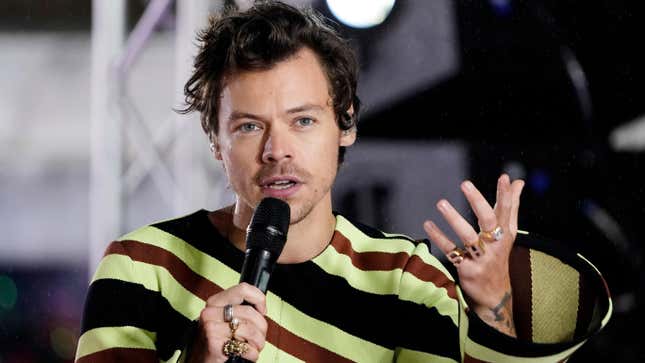What Exactly Can We Learn From Harry Styles? Enough For A College Course, Apparently
Jumpsuit 101? Treating People With Kindness 303? Not quite! Jezebel speaks to the Texas State University professor on his new class that broke the internet.
EntertainmentMusic

“This is actually the most in-depth conversation I’ve had about this class,” Dr. Louie Dean Valencia confides near the end of our interview. It’s something of a compliment, considering that since July 16, when he announced a new university course of his own conception—”Harry Styles and The Cult of Celebrity: Identity, the Internet and European Pop Culture”—the Texas State Honors College professor has maintained a schedule solidly booked with calls just like this one.
As one would expect of any accredited class with a celebrity at its center (see New York University’s Taylor Swift course), the post went viral and has since garnered an onslaught of press and reactions that ranged from “How soon can I enroll?” to “1st class: How to queerbait.”
Some have dismissed Valenvia’s class as unserious, or as one person on Twitter put it, “the downfall of civilization;” but his prospective pupils will certainly have plenty to debate about the undeniable mayhem Styles has inflicted upon mainstream pop music.
One doesn’t need to hit the books (read: Rolling Stone and Better Homes and Gardens) to glean that Styles is currently one of the world’s preeminent pop stars—he dominates charts, splinters records, and recently, stamped his name on a lifestyle brand that boasts a modest range of otherwise forgettable nail polishes, apparel, and exactly six skincare offerings. He’s also starring in two upcoming film projects, selling out international stadiums, and exclusively attracting suspiciously impeccable press. As a result, his fanbase rivals that of the BeyHive, Swifties, Beliebers, and the like—yet the admiration runs deeper, somehow. Unlike many of his fans, Styles, an obscenely wealthy white, and apparently cisgender and heterosexual man, can grace the cover of Vogue in a gown only to be anointed a “modern man.” He’s free to flounce around on stage with a gay pride flag to the cheers of thousands, and aid teenagers in coming out nightly, despite an otherwise increasingly queerphobic political culture.
A quick scroll through Valencia’s Twitter feed indicates that even he’s a fan. And while that hardly precludes him from being an apt professor in that of everything Styles and celebrity culture, it does leave one to wonder whether or not his classroom could become just another place for the university’s Harry Styles fan club to convene. Fortunately, Valencia talked Jezebel through it.
This conversation has been edited for length and clarity.
What made a class on Harry Styles and celebrity culture feel necessary?
In the summer of 2020, when all of us were trying to hide from the world, I was like, “What would I do if I were 16 years old, and I was stuck at home during a pandemic?” So, the first thing I did was buy myself an electric guitar, and then I started thinking about what type of project can I do from home that I’d be really interested in. I started working on what will be a book on Harry Styles and sort of the idea of celebrity internet culture, and basically how things have changed in the last 12 years or so in the world.
The next year, I taught all my classes on Zoom, and it was an extra challenge to break down barriers with students. One way that I found that was really effective was just talking about my own passions, the music that I like, and they did the same—even if we were just a bunch of little squares on the computer screen—and it opened up a lot of really interesting conversations about Harry Styles. He has a very positive message; he even has a song about treating people with kindness, which is mentioned in his social media posts about issues of anti-racism and misogyny. He’s taken very firm stances with the queer community and even protested in Black Lives Matter.
-

-

-

-

-

-

-

-

-

-

-

-

-

-

-

-

-

-

-

-

-

-

-

-

-

-

-

-

-

-

-

-

-

-

-

-

-

-

-

-








































